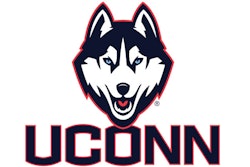If the comments on AB's website Wednesday afternoon are any indication, the referees at Saturday's Massachusetts Division IV-A Super Bowl state high school championship game in Boston made the wrong call when they enforced a sportsmanship rule that prohibits players from celebratory or taunting behavior while scoring a touchdown. For those who want to see the actual play, during which Cathedral High School quarterback Matthew Owens raised his left arm in triumph more than 20 yards away from the end zone, the Boston Globe has obtained video footage.
According to the Globe, the Massachusetts Interscholastic Athletic Association uses the same officiating rules as college football, which state the following: "If the ball is alive when the player makes a taunting gesture, then the penalty is enforced at the spot of the foul - and the key outcome: no touchdown."
A poll posted by the paper asks readers whether they think "the rule is on the books and it had to be called" or "this incident didn't merit a penalty." An overwhelming majority (more than 80 percent) have indicated the touchdown should have stood.
On Wednesday afternoon, the MIAA issued the following statement about the controversy: "The official involved reported he had determined a violation of NCAA Football Rules and Interpretations of Rule 9, Section 2 covering Unsportsmanlike Conduct Section A. He called the violation and assessed the penalty. There is no provision in MIAA rules (or rules for any other sport at any other level) to overturn an official's call after a game has been concluded. Once the final whistle is sounded the game is over. (Reference - MIAA Handbook Rule #17, Page 24) The Cathedral coach chose not to protest the call when it was made.
"At the start of the season, the MIAA and football officials took comprehensive measures to ensure that everyone understood this rule. In fact, the officials at this game reminded the captains and coaches that there would be zero tolerance for any unsportsmanlike actions. Likewise, this message was communicated in the pre-playoff game administrative meeting, as well as the MIAA's Super Bowl Breakfast with coaches and captains.
"Anyone may parse the language of rules and apply them as they see fit. Contest officials must familiarize themselves with the rules, both the letter and the sprit, and bring their judgment to bear in calling the game. Per the Points of Emphasis in the NCAA Rulebook: 'When an official imposes a penalty or makes a decision he is simply doing his duty as he sees it. He is on the field to uphold the integrity of the game of football, and his decisions are final and conclusive and should be accepted by players and coaches.'
"The MIAA Philosophy reflects that high school students who participate in educational athletics learn many things from that experience including lessons that will be helpful as they go forward in life. While we hope and wish they would all be from positive experiences, sometimes that is not the case. Losing a game or having an official's call go against you or your team are all part of sports. Just like athletes and coaches, officials try hard to do the best job possible. Athletes must learn to put these things behind them and move forward. During their lifetime they will experience similar situations where they feel 'wronged' by a superior or authority figure and they must learn to deal with that situation.
"Finally, we would hope that in peoples' reaction to this situation they would consider the students and coaches at Blue Hills Regional Vocational Technical School, who feel their properly won championship is being tarnished and discredited."




































